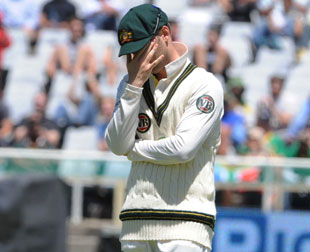Australia in South Africa, 2011-12
Test matches (2): South Africa 1, Australia 1
One-day internationals (3): South Africa 1, Australia 2
Twenty20 internationals (2): South Africa 1, Australia 1

|
|||
|
Related Links
Series/Tournaments:
Australia tour of South Africa
Teams:
Australia
| South Africa
|
|||
An Australian tour of South Africa is about so much more than the cricket. It crackles with a tension that reaches tipping point when siblings of a similar psyche face each other 22 yards apart. Thousands of South Africans have chosen Australia over their own country as a place to live, and the suspicion is buried deep among South Africans that, whatever they think, say and do, Australians will always be able to think, say and do it better.
In other respects, the series was a radical and unwelcome departure from the norm. A programme of two Twenty20 games, three one-day internationals and two Tests was never going to escape a mauling in public and in the media - and it didn't. Why the additional Twenty20? Why only two Tests? And, while we're at it, what exactly were they thinking giving a Test to Newlands in November, a wet month in the Cape? Preparation for the 2012 World Twenty20 in Sri Lanka was the feeble answer trotted out to the first question; the timing of the Champions League was the response to the second. The Cape Town question never got a satisfactory explanation.
The detractors were fully armed after a Test series that enthralled and entertained. The first match was done and dusted in a little over two days. Australia did something quite extraordinary: in a game where only 663 runs were scored, their captain Michael Clarke made 151 in one visit; they bowled South Africa out for 96 to take a first-innings lead of 188 - and then lost by eight wickets.
The Second Test belonged to the new 18-year-old fast bowler Pat Cummins, Australia's youngest Test debutant since Ian Craig in 1952-53. Cummins looked a cut above Australia's other bowlers: his six wickets in the second innings kept the fourth-innings target down to 310, which he polished off himself. But no bowler profited more from the helpful pitches than the relentlessly accurate Vernon Philander, who banished memories of his first crack at international cricket four years earlier to take 14 wickets.
Going into the series, there was a significant amount of national angst concerning the South Africans' inactivity since the World Cup, especially when measured against Australia's tours of Bangladesh and Sri Lanka. The most recent memory South African supporters had of their team was an anaemic performance in the World Cup quarter-final against New Zealand in March, which only served to heighten the concerns. Allan Donald had helped plot that particular defeat as New Zealand's bowling coach. Now he returned to the South African fold in the same role, having been recruited by Gary Kirsten - himself lured back as head coach of his native country after guiding India to triumph at the World Cup.
Having relinquished the captaincy in the shorter formats, Graeme Smith found himself under pressure to keep the Test job after choosing the love of a woman over the duty of explaining to his compatriots what had gone wrong: he flew to Morgan Deane's side in Ireland straight from the World Cup, and married her in August. Hashim Amla was a stopgap limited-overs captain after the permanent appointment, A. B. de Villiers, was ruled out of the series by a finger injury. But Amla clearly didn't enjoy the experience that much: "If I have to do it in the future, I would take some time to consider it."
Lurking like a bloodstain in the background was an alleged scandal involving around R5m (about £400,000) in bonuses paid by the organisers of the 2009 IPL and Champions Trophy - both played in South Africa - to 40 Cricket South Africa employees. The money was allegedly not declared to the board, and paid in addition to official bonuses to the same staff for the same work. The affair was the subject of an inquiry by South Africa's minister of sport.
Not that Australia arrived without skeletons rattling around their own kit coffins. The post-Argus Review hand-wringing was at its peak, while Ricky Ponting's future provoked a debate that was in turn desperate, denialist and disingenuous. Clarke, his successor as captain, didn't seem to have a friend in the world - not to mention a coach, Troy Cooley, who was only a stand-in, following Tim Nielsen's resignation. Clarke was, if you believed the whispers, arrogant and disrespectful of his roots.
All that would usually have been enough for one tour, but then, on what would have been the fourth night of the Cape Town Test, Peter Roebuck, a renowned cricket writer, ended his life by jumping from the window of his hotel room. The precise reasons for his death were unknown but, for a few days, Roebuck was the only story in town.
Match reports for
1st T20I: South Africa v Australia at Cape Town, Oct 13, 2011
Report |
Scorecard
2nd T20I: South Africa v Australia at Johannesburg, Oct 16, 2011
Report |
Scorecard
1st ODI: South Africa v Australia at Centurion, Oct 19, 2011
Report |
Scorecard
2nd ODI: South Africa v Australia at Gqeberha, Oct 23, 2011
Report |
Scorecard
3rd ODI: South Africa v Australia at Durban, Oct 28, 2011
Report |
Scorecard
Tour Match: South Africa A v Australians at Potchefstroom, Nov 1-3, 2011
Scorecard
1st Test: South Africa v Australia at Cape Town, Nov 9-11, 2011
Report |
Scorecard
2nd Test: South Africa v Australia at Johannesburg, Nov 17-21, 2011
Report |
Scorecard

